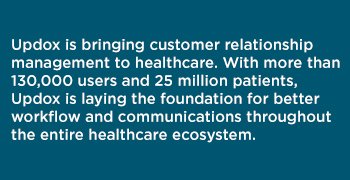Updox: Helping Independent Physicians Survive and Thrive
WHAT IF whenever a patient showed up and needed care, the physician had access to all the information about that patient?
Updox was founded because independent physicians and practices needed a secure way to communicate with other physicians and patients, and they needed to do it in a way that helps coordinate care and better manage relationships.
Today, thirty-plus employees, 130,000 users, and 25 million patients later, Updox CEO Michael Morgan frequently begins discussing the problems in healthcare by talking about burritos.
“When I talk to people about what we do, I ask how many of them can order fast food with an app on their phone,” Morgan said. “Then I ask them how many can interact with their doctors in the same easy way. Not very many patients can.”

It’s an issue that hits home. As healthcare is evolving to a consumer-driven marketplace, doctors’ patients are now becoming customers.
“Patients are beginning to make decisions about their healthcare based in the same way they make decisions about other things they buy,” said Morgan. “Ease of use and customer service are becoming critical as more and more patients are choosing physicians based on how they can interact with them.”
Large healthcare systems have had the muscle to manage through these marketplace shifts. But for independent physicians (who still make up about half of all physicians in the US), it’s been a challenge.
Payment models are shifting. Physicians are no longer getting paid fee-for-service. Instead insurance reimbursement is becoming based on patient outcomes.
It’s a new approach that calls for new attitudes, different business models, new technology, and even different staff roles as physicians seek to find more efficient and cost-effective ways to produce better outcomes.
Practices seek to improve patient relationships while increasing efficiency
It’s a perfect storm of opportunity for Updox, a company that’s much attuned to independent physicians and group practices. Updox delivers cloud-based services that help physicians improve patient care relationships and outcomes while achieving a measurable impact on the medical practice’s bottom line.
Updox excels at identifying and addressing the pain points in independent medical practices. The company has created a spectrum of applications that allow independent physicians and practices to offer more services to patients in ways that lower overhead costs, free up staff time, improve cash flow, and allow physicians to spend more time on patient care.
“With such a large number of physicians and groups using our services, we’re getting first-hand insight into how the industry is changing and how these practices use technology to build stronger relationships with patients and other providers to better coordinate care,” Morgan said.
Healthcare is a heavily regulated industry of inter-dependent businesses and stakeholders. But inter-dependent, doesn’t necessarily mean inter-connected.
“Initially, electronic health records were brought into healthcare to collect data and digitize that information. It was thought all this data would go into one central bank or health information exchange (HIE) and could be accessed by providers as needed. One giant repository sounded good in theory, but that fell apart because it was too hard to do and no one wanted to pay,” Morgan said. “The technology was too expensive.”
A better way Morgan says is to connect information point to point, where and when the information is needed, in an easy, efficient way. That leads to Updox Direct Secure Messaging
Making record-sharing and interoperability work with secure email
With Updox Direct Secure Messaging, physicians can securely communicate and share personal health information (PHI) with other healthcare providers, hospitals, and partners who are part of a patient’s care plan.
“It’s essentially a secure ‘Gmail,’” Morgan said, “an easy, simple-to-use and cost-effect email that patients and physicians can use after they go through a validation process.”
It’s all part of the evolution that’s happening in healthcare.
“Now that all this information is flowing back and forth, physicians can better engage patients in making smart decisions for that patient’s own health,” Morgan said. “We have what the industry needs and have become the central network for communicating all this information.”
Technology drives a healthcare shift
Morgan feels hopeful. “There has been so much discussion for so many years and so many things tried to improve the quality of care and reduce costs. We’re at the point where technology is supporting change.”
Now that an accepted infrastructure exists and is rapidly expanding to all parts of healthcare to securely exchange information, the next step for Updox is to continue to develop apps that use the data to enhance the many relationships within healthcare and allow them to drive improved outcomes.
Updox is able to expand the value of the network even more rapidly because the power of the platform is driving demand from third parties who want to leverage the Updox network to deploy a wide range of solutions that benefit physicians, partners and healthcare consumers. That’s how Updox is changing the way healthcare communicates.

